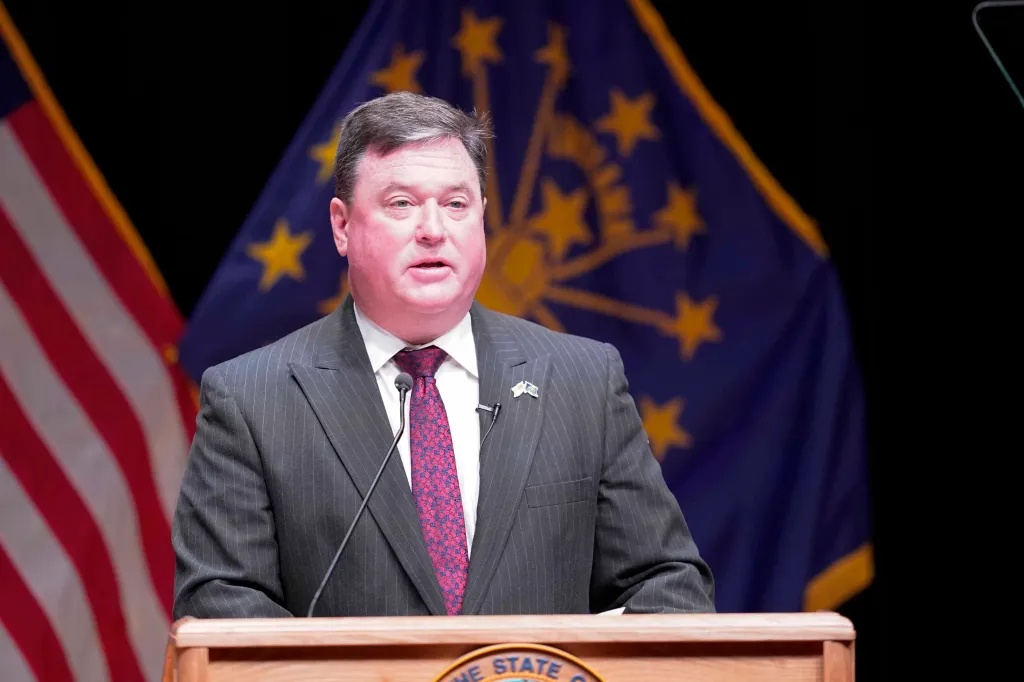
Two Indiana officials are supportive of proposed U.S. Environmental Protection Agency deregulations — calling them “burdensome” and “ineffective” — nearly two months after the actions were announced at an Indianapolis auto dealership.
“These rules are a bureaucratic power grab that burdens hardworking Hoosiers and families with unaffordable regulations,” Attorney General Todd Rokita said in a Thursday news release. “By scrapping it, the EPA would be restoring common sense, the rule of law, and American energy independence. We fully support the rollback to restore policies that put our country back on the path to prosperity and protect Hoosier workers.”
Rokita and Indiana Department of Environmental Management Commissioner Clint Woods both support the EPA’s plans to rescind the 2009 Endangerment Finding, which is a science-based finding that identified six greenhouse gases that threaten public health and welfare of current and future generations, according to the Associated Press. A range of rules that limit pollution from cars, power plants and other sources are based on the findings, but EPA Administrator Lee Zeldin also has proposed ending a requirement that large, mostly industrial polluters report their planet-warming greenhouse gas emissions, canceled billions of dollars in solar energy grants, and eliminated a research and development division, the AP reported.
Rokita and Woods submitted a joint letter to Zeldin on Sept. 22, saying the regulations prohibit Hoosiers from access to “affordable, reliable vehicles and hurt Indiana’s small businesses in the manufacturing and industrial industries.”
According to Zeldin and other Trump administration officials, the 2009 Endangerment Finding has been used to justify more than $1 trillion in regulations, and deregulation will save more than $54 billion annually. Repealing greenhouse gas emission regulations for motor vehicles and engines will give Americans “the ability to purchase a safe and affordable car” and decrease “the cost of living on all products that trucks deliver,” according to Post-Tribune archives.
Zeldin announced the actions in July at an Indianapolis truck dealership.
Rokita and Woods argue in their letter that the EPA under former President Barack Obama’s administration misused a Congress-designed statute from the 1960s and 1970s to “tackle local problems like smog, not global warming.”
Rokita also believes the science is shaky and relies on outdated predictions that overstate the impact of carbon dioxide, arguing that if all car emissions stopped in the U.S., “it wouldn’t noticeably change global temperatures.” He also argued that the rules inflate car prices by thousands of dollars, which harm low-income Hoosiers and keep older and dirtier cars on the road, according to the news release.
“The U.S. EPA’s 2009 Endangerment Finding and its resulting greenhouse gas regulations exceed the agency’s limited authority under the Clean Air Act and suffer from significant scientific, procedural, and legal defects,” Woods said in a Thursday news release. “Given Indiana’s primary responsibility for air pollution control, its proven track record of improving air quality, and its bottom-up success in reducing greenhouse gases without federal overreach, IDEM strongly supports these heavy-handed standards that impose costs on Hoosiers without delivering measurable environmental benefits.”
The American Lung Association announced in April that Hoosiers are breathing some of the nation’s most polluted air in its “State of the Air” report, with the Indianapolis metro area ranked 54th worst in the nation for ozone pollution and 21st worst for particle pollution, according to Post-Tribune archives.
In Northwest Indiana, the American Lung Association gave Lake County failing grades in three categories: ozone pollution, 24-hour particle pollution, and annual particle pollution. Porter County only received a passing grade for annual particle pollution.
Ozone and particle pollution can cause premature death and other health effects, including asthma attacks, heart attacks, strokes, preterm birth and impaired cognitive function, according to the American Lung Association. The organization also found that particle pollution can cause lung cancer.
Environmental activists nationwide expressed concerns with the Endangerment Finding rollbacks, including the Environmental Protection Network, a nonprofit of former EPA officials, that said the agency is choosing polluters over people.
EPA’s repeal tries to go against the U.S. Supreme Court’s decision in Massachusetts vs. EPA, which compelled the agency to regulate greenhouse gas emissions “based on overwhelming scientific evidence,” according to the EPN. Its repeal threatens every major federal climate protection adopted in the past 15 years, according to the organization.
“This repeal is not a misunderstanding of the science. It is a calculated decision to ignore it — and the law,” Michelle Roos, EPN executive director, previously said, according to Post-Tribune archives. “By discarding the Endangerment Finding, EPA is surrendering its authority, deserting vulnerable communities and dismantling decades of progress. The public health consequences will be immediate, widespread and devastating.”
Ashley Williams, executive director of Just Transition Northwest Indiana, previously told the Post-Tribune in an email that the rollback is a “disgraceful publicity stunt” that doesn’t put American residents first.
“With every regulatory rollback, now including the repeal of the Endangerment Finding, our planet is steadily speeding into climate chaos, impacts felt daily by frontline communities in the steel-dominated Rust Belt,” Williams previously said. “We won’t stop organizing to hold this administration accountable for the harm they’re inflicting on Hoosiers — at the ballot box and in the streets.”